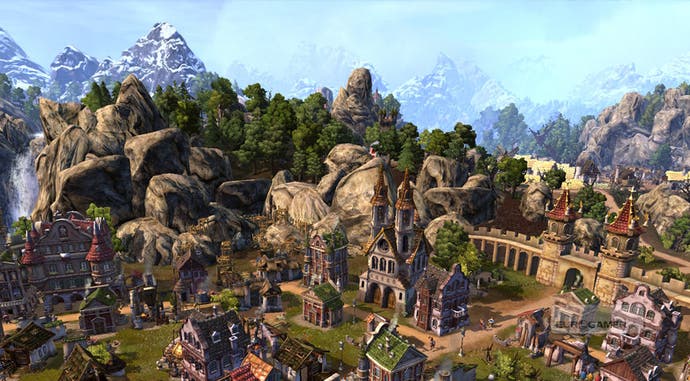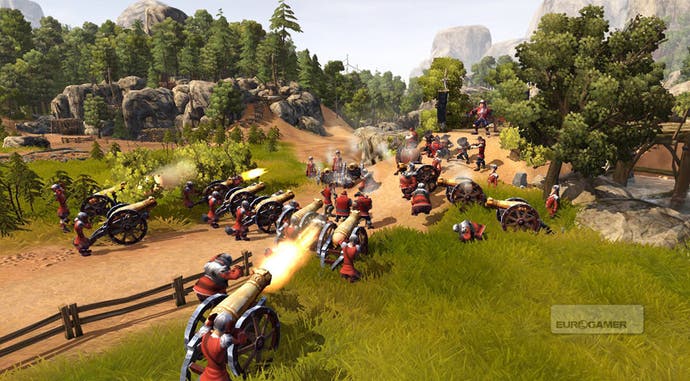The Settlers 7: Paths to a Kingdom
Immigrant song.
There's an apt flourishing of joy at the start of a Settlers 7 map. All the sprawling empty space and untapped resources stretch lazily into the distance, the landscape rendered in gorgeous, cartoony perfection. Virgin territory, pleasant olde worlde music and the simple rules of the game lead you on to dizzy, stupid dreams.
'That's where I'll put my grain farms,' you think to yourself. 'I'll put a street of bakeries just nearby, for easy access, and the sawmills can go next to the storehouse! This settlement will be perfect! No, not at all like all the other ones.'
20 minutes and 500 addicted clicks later, you're staring at a terrible mess. Your terrible mess. See if you can figure out what to do in the following example:
There's an army on your doorstep, so you need coins to raise an army of your own. Like, right now. You currently have no coin because your coin mints have stopped working, because they have no coal. You ran out of coal ages ago, and in desperation threw up a dirty little coking industry where you'd originally planned to put your tailoring district just so you could make new coal out of your over-abundance of wood. Except your coking plants need tools before they can start working. Checking your toolmaker, you find that he's stopped working because he... has no coal.

This is the beauty of Settlers 7. While most city-builders reveal their difficulty with that slow, depressing realisation that your grand design isn't good enough, or with the sinking feeling that you've been doing something wrong all along (perhaps without even knowing what), the rules of Settlers 7 are too simple for that.
To highlight what I mean, a sheep farm takes 1 water and produces 1 wool every so often. You can watch your little shepherd shearing it and carrying it to the storehouse, if you're feeling indulgent. A weaver will then turn that 1 wool into 1 cloth. A tailor turns 1 cloth and 1 food into 1 clothes, and a trader can swap 3 clothes for 6 gold. It's all simple stuff.
And yet despite these basic, almost wholly automated systems, you're constantly fixing really satisfying problems. Almost the entire game lies in accidentally creating and identifying all these little knots in your production line that play like one big interconnected puzzle. It's a new take on the 4X game: less Explore, Expand, Exploit, Exterminate, more Expand, Exploit, Exterminate, Except wait, balls, you're out of iron. Where on Earth did it go?

It's great fun and ungodly compelling, especially once the single-player campaign gets up to speed and begins presenting you with opponents who actually fight back.
Winning in Settlers 7 is down to a new system called Victory Points. You can still peel your opponent's regions from him one-by-one using an army and win via eradication, but an alternative has been provided for players who don't enjoy a slow, painful defeat that renders the last 10 minutes of the match pointless. Victory Points give players a grab-bag of shared objectives - have the most coins, the highest prestige level, a certain region and so on - and victory is awarded to the player who reaches a set number of Points first.
Dry as this might sound, it's fun and hugely tense. Sliders that show everyone's place on each of the Points mean you can race your opponents to certain targets, hit them where they're weak or even plan abrupt victories by snatching two or three points within a minute of one another.








